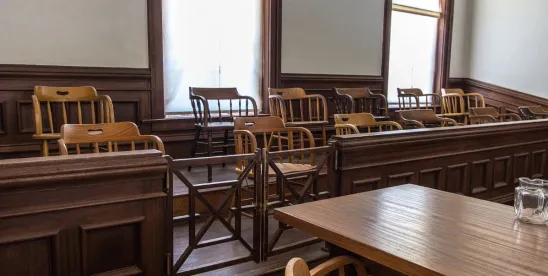The Seventh Circuit recently analyzed when a party has a right to a jury trial for claims of aiding and abetting breaches of fiduciary duties arising out of a merger.[1] The Court acknowledged that the Delaware-law claims at issue were “analogous to actions historically brought in courts of equity.”[2] The stockholder sought legal relief, however, which triggered the Seventh Amendment’s jury right.[3] The Court held that “[w]hen a party raising an equitable claim seeks both legal and equitable relief, a district court should allow the case to be presented to a jury.”[4]
The case involved claims made by Overwell Harvest, Ltd., an investor of Neuroscience, Inc. When facing dire financial circumstances, Neuroscience accepted a purchase offer from Trading Technologies International. Before the sale closed, Overwell made a competing offer, but it had less favorable and more speculative terms—the competing offer called for a higher cash payment at closing but no post-closing payments and would allow Overwell to walk away after a six-week exclusivity period. Trading Technologies revised its offer to match the sum Overwell offered, while all other terms remained the same. Neuroscience’s board evaluated the offers and determined Overwell’s was less desirable and more risky than that of Trading Technologies, given the company’s financial situation. After Overwell obtained a temporary restraining order blocking the sale until all required statutory notices had been provided to the shareholders, Neuroscience fulfilled the notice requirements and closed the deal with Trading Technologies.[5] Overwell then amended its pending suit (where the TRO was obtained) to include a claim against Trading Technologies for aiding and abetting fiduciary duty breaches by Neuroscience’s officers, seeking compensatory and punitive damages and “all available restitutionary relief, including . . . disgorgement.”
Under the Seventh Amendment, a party is entitled to a jury trial in “[s]uits at common law, where the value in controversy shall exceed twenty dollars.” The Supreme Court has clarified that “suits at common law” include those “in which legal rights were to be ascertained and determined, in contradistinction to those where equitable rights alone were recognized, and equitable remedies were administered.”[6] Suits to determine legal rights were historically brought in English law court, whereas suits to determine equitable rights alone were heard in English courts of equity or admiralty.[7] Thus, to determine whether a party has a right to a jury trial, a court must (1) “compare the . . . action to 18th-century actions brought in the courts of England prior to the merger of the courts of law and equity” and (2) “examine the remedy sought and determine whether it is legal or equitable in nature” — the second prong of this analysis being more important than the first.[8] Indeed, the relief sought is key and was dispositive in this case — “even if a claim is not historically legal, the plaintiff may have a right to a jury trial if he pursues legal relief.”[9]
The district court determined that Overwell’s equitable claim seeking both legal and equitable relief was “more like a suit in equity” and thus did not give Overwell the right to a jury trial. On appeal, the Seventh Circuit found that the district court erred in denying Overwell’s jury demand — “though it raised only an equitable claim, because it sought legal relief, it had a right to a jury trial.”[10] However, it affirmed the district court’s ruling because Trading Technologies would have been entitled to a directed verdict.[11]
The Seventh Circuit acknowledged that district courts within the circuit had reached contrary conclusions when analyzing the right to a jury trial but, undertaking a historical review, determined they did so “by underweighting the need to have juries decide damages.”[12] The Seventh Circuit analyzed the leading district court case on the issue, Client Funding Solutions Corp. v. Crim, 943 F. Supp. 2d 849 (N.D. Ill. 2013), where the district court found there was no right to a jury trial because the dual nature of the legal and equitable relief sought by the plaintiff left the second prong of the jury right analysis sitting either “inconclusively in equipoise” or leaning towards equity because “the requested equitable relief predominate[d] the parties’ briefing.”[13] However, the Seventh Circuit determined that the Client Funding Court had relied heavily on Cantor v. Perelman, No. CIV.A. 97-586-KAJ, 2006 WL 318666 (D. Del. Feb. 10, 2006) in reaching its conclusion but, in doing so, failed to acknowledge its unique facts,[14] ultimately concluding that the Client Funding court’s reliance on Cantor was “misplaced and the court should have instead adhered to the principle that legal issues should ordinarily be presented to a jury.”[15]
At the end of the day, the Seventh Circuit has determined that “unless the plaintiff is not seeking legal relief, its request for some equitable relief is not dispositive of its right to a jury trial on the legal issues in its case.”[16]
If you have any questions about this article, contact Andrew Howell, who is a securities and financial fraud litigator in Foley’s Dallas office, or your Foley attorney.
[1] Overwell Harvest, Ltd. v. Trading Technologies International, Inc., No. 23-2150, 2024 WL 3755363 (7th Cir. Aug. 12, 2024).
[2] Id.
[3] Id.
[4] Id. at *4.
[5] The action apparently continued as a derivative action even after closing.
[6] City of Monterey v. Del Monte Dunes at Monterey, Ltd., 526 U.S. 687, 708-09 (1999) (emphasis in original).
[7] Id.
[8] Granfinanciera, S.A. v. Nordberg, 492 U.S. 33, 42 (1989) (quotation omitted).
[9] Overwell at *4 (citing Chauffeurs, Teamsters & Helpers, Loc. No. 391 v. Terry, 494 U.S. 558, 573-74, 110 S. Ct. 1339 (1990)).
[10] Overwell at *1.
[11] Id. at *1, *6.
[12] Id. at *5.
[13] Client Funding Solutions Corp. v. Crim, 943 F. Supp. 2d 849, 858 (N.D. Ill. 2013)
[14] Overwell at *5. Specifically, the plaintiff in Cantor sought “the benefits obtained by the defendants” as equitable relief and “all benefits obtained by defendants as a result of their breaches of fiduciary duty” as compensatory damages.[14] Their equitable relief was “intertwined with the request for compensatory damages,” and the Cantor court concluded that the mixing of the requested equitable and legal relief meant that the legal relief sought was not strictly legal—tipping the scales in favor of the plaintiffs’ claims being judged equitable and not creating a right to a jury trial. The relief sought in Client Funding, however, was not so intertwined.
[15] Overwell at *5.
[16] Id. at *6 (citing Dairy Queen, Inc. v. Wood, 369 U.S. 469, 473, 82 S.Ct. 894, 8 L.Ed.2d 44 (1962) (“[A]ny legal issues for which a trial by jury is timely and properly demanded [must] be submitted to a jury.”).




 />i
/>i

